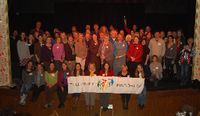18 Feb Telluride Foundation following trend to measure impact through outcomes
Non-profits who apply to the Telluride Foundation listen up. This announcement will definitely have an impact on your institution or event.

2010 Telluride Foundation
Grantees
As philanthropic giving has decreased in the latest economic downturn, it has become necessary for nonprofit organizations to better demonstrate the impact of their work in order to be competitive for a smaller pool of funding. As such, the national news is full of examples of program evaluation, assessment and accountability. Whether it is teacher accountability through student testing, the requirement that American Recovery and Reinvestment Act (stimulus money) grant funded projects must track job creation, or the Disaster Accountability Project, which evaluates disaster relief and aid organizations’ response to natural disasters, there is a national trend toward measuring outcomes to determine the effectiveness of programs to bring about positive social change.
The Telluride Foundation, as well as other foundations nation-wide, is developing a plan to help lead this trend. Funders and donors are demanding accountability and demonstration of the impact of their contributions. Furthermore, donors and grant funders are demanding assurance that their donations and grants are being spent effectively and making a positive difference. The Telluride Foundation has begun to work with similar foundations and local nonprofits to do more with less. The hope is that, in demonstrating that every dollar given results in greater benefits to the community, donors, foundations, and federal grant makers will be encouraged to increase their contributions.
In 2010, the Telluride Foundation celebrated its tenth anniversary by exceeding $18 million in competitive grants awarded to the community since its inception.
"With a track record of ten years of grant making to over 100 community organizations, the Foundation board and staff want to review the effectiveness of our grant making and determine if improvements should be made, " said Paul Major, President and CEO of the Telluride Foundation. "We want to prove that our grant making is producing the stated outcome of the Foundation's mission — to improve the quality of life of the Telluride region."
Since 2001, the Foundation has awarded over $6.6 million in Community Grants. Community Grants, directly controlled and awarded by the Foundation Board, often provide general operating support to nonprofits. The Foundation currently grants to regional nonprofits that have proven financials, address a community need, demonstrate strong community support, and have effective and efficient delivery of program services.
In the past, nonprofits often focused their evaluation measures on outputs, including how much money spent, number of people served, and client satisfaction; however, these measures don't necessarily have a direct correlation to impacts on clients. For example, just because an early childhood education organization is increasing the number of children enrolled, doesn’t mean that they are becoming more effective at preparing their children for kindergarten.
Furthermore, each nonprofit tends to measure its success independently, in an isolated manner from other nonprofits who might have similar overall goals.
This year, the Foundation plans to work with local nonprofits to determine outcomes that describe the impacts and benefits to clients during and after participation in the nonprofits’ programs – i.e. what positive change in behavior occurred, as well as the indicators that measure whether the outcomes have been met. For our early childhood education organization, an outcome might be children's readiness for kindergarten with an indicator being their scores on kindergarten readiness tests.
To begin this grant making analysis, the Telluride Foundation is collaborating with the Aspen Community Foundation, and numerous other state and national foundation resources to begin a discussion on and research of best practices among its grant making and nonprofit organization programs. The Foundation plans to engage different sectors of nonprofits (i.e. arts, early childhood education, athletics, health and human services, etc.) to determine common outcomes, indicators for each category of grant making, and data collection procedures in an effort to get similar organizations to work towards common goals.
"As nonprofits are increasingly being required to measure and report their outcomes to funders and their constituents," explained Major, "we believe this exercise will also be very beneficial to our local nonprofits. In addition, by measuring the achievement of common outcomes within a category of nonprofits, we can analyze the collective impact of individual nonprofit's missions and programs, rather than each nonprofit's impact being isolated and independent.”
The Foundation and local nonprofits can benefit greatly from a wide variety of best practices research on measuring outcomes being conducted nationwide such as work done by The Gates Foundation to figure out how teachers should be evaluated.
The Telluride Foundation exists to create a stronger Telluride community through the promotion and support of philanthropy. It is a non-profit, apolitical community foundation that provides year-round support for local organizations involved in arts, education, athletics, charitable causes, land conservation and other community-based efforts through technical assistance, education and grant making. As a grant maker, The Foundation awards grants to qualified applicants that serve the people living and working in the Telluride area for the purpose of enhancing the quality of life within the region. For more information on the Telluride Foundation, visit www.telluridefoundation.org.


Sorry, the comment form is closed at this time.